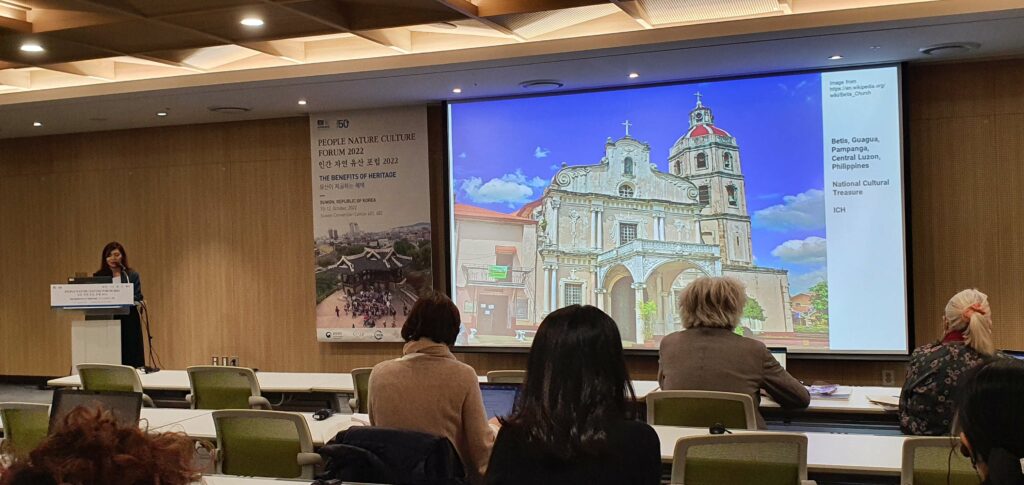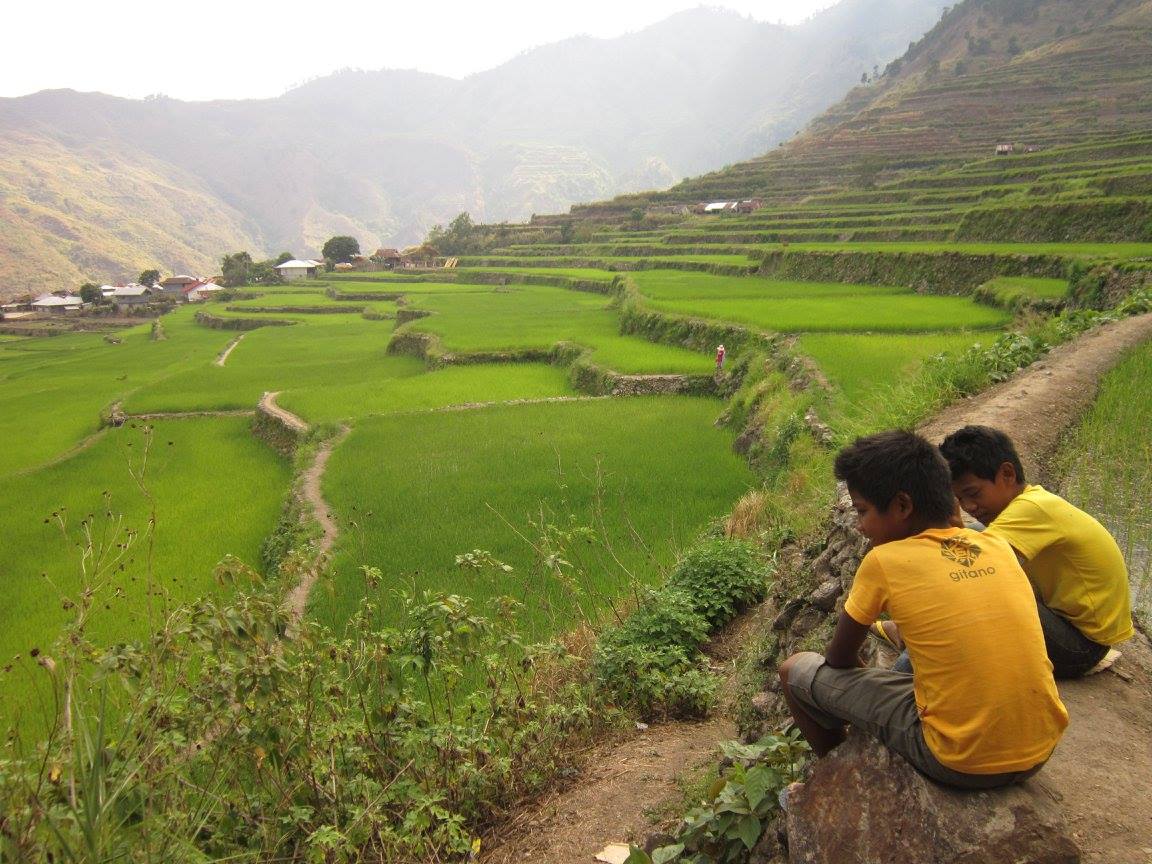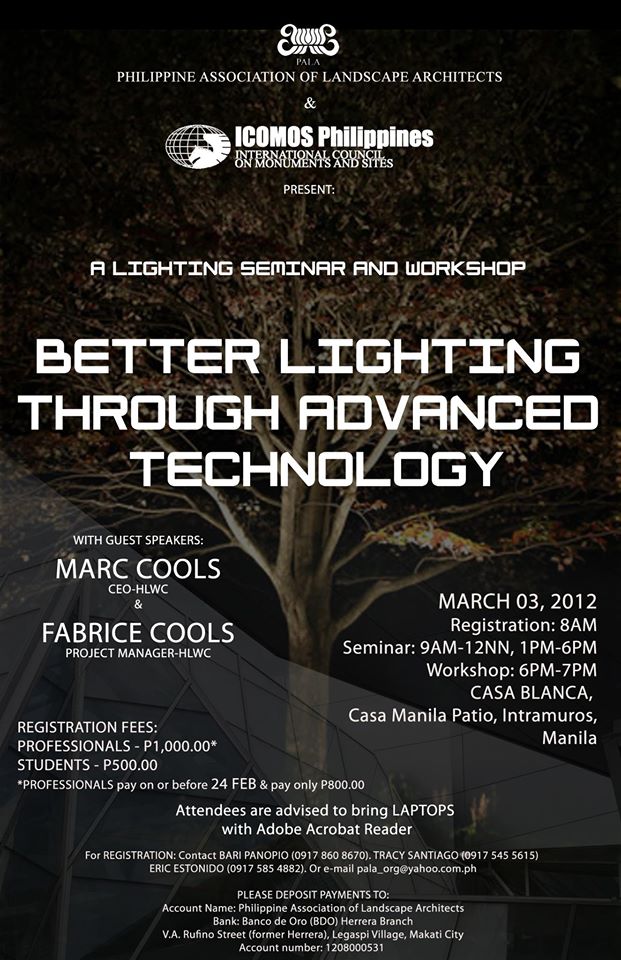To provide how management and conservation of heritage places can give a dynamic and mutually beneficial role in society today and long into the future, the People-Nature-Culture (PNC) World Heritage Leadership (WHLP), a capacity-building programme delivered by IUCN, ICCROM, UNESCO World Heritage Centre, and other organizations, with the support of the Norwegian Ministry of Climate and Environment and other partners, is established to equip heritage site managers worldwide.
Among the fully-funded scholars is ICOMOS PH member Dr. Laya Boquiren Gonzales, who was invited to participate and present at the PNC Forum, which celebrated the conclusion of the 2017-2022 Korea-ICCROM Funds in Trust, the approaching completion of Phase I of the World Heritage Leadership Programme (WHLP) and the 50th anniversary of the World Heritage Convention. The event was held from October 10 – 12, 2022 in Suwon, Republic of Korea (ROK)
Dr. Boquiren – Gonzales presented “How can we establish good governance arrangements that ensure they benefit from the conservation of those places?” on Day 2 under the theme of Who benefits from heritage.

Dr. Boquiren-Gonzales provided highlights on her presentation from the forum:
The conservation of the Santiago Apostol Parish in Betis, Guagua, Pampanga, a National Cultural Treasure, is an excellent case of community-based safeguarding of intangible cultural heritage (ICH) and application of the C’s of Governance, including the following:
- collaboration of management actors;
- concerted efforts of multiple stakeholders including local champions;
- conservation anchored on a sense of collective devotion and pride and not only tourism as the sole motivation;
- coordination among a consulting committee;
- collaboration of local cooperatives for the safeguarding of ICH;
- celebrations that dramatize the significance of traditions and honor collective memory;
- contracting technical experts in the conservation of built heritage, a convergence of space of interests;
- consensus and coalition-building;
- cooperation strengthened by social relationships; and
- collective pride rooted in one’s occupational identity and place affinity.
The claiming of public spaces (SDG 11.5 and SDG 11.7), originally intended for disaster mitigation, became an intergenerational significance collective skills formation anchored on place wisdom (the space is now an artisans’ haven and eco park).
Substantial impacts include the integration of woodcarving into the Technical and Vocational Education and Training (TVET) system by local champions and acknowledgment of the need to integrate heritage into basic educational pedagogy. Heritage, including intangible properties, provide livelihood (SDG 8) entrepreneurial opportunities beyond mere employment (SDG 10), a sense of well-being and contentment, pride, social cohesion, and place affinity. It is life itself.
The conservation of built heritage and safeguarding of craft production unfold in relationships forged over time across levels of the locality. Decisions are arrived at through consensus. Concerted efforts are the product of coalition-building.
Ideally, cooperation is institutionalized or formalized under the coordinated efforts of national government agencies and provincial and municipal governments. When the local government and national government agencies enter the picture, the conservation of built heritage and safeguarding of the intangibles must be achieved through efficient planning and mobilization of resources, and reflected in Key Performance Indicators (KPIs); implemented in Programs, Projects, and Activities (PPAS); and audited using the right monitoring and evaluation tools.
Conservation efforts are best protected by legislation and enshrined in the constitution. However, the strength of implementing the terms of such arrangements and the rule of legislation are just as potent as the combined aspirations of communities. Therefore, community empowerment and collective action must persist above all.
To know more about the PNC forum, kindly visit this link ➡️ People-Nature-Culture Forum takes a closer look at the benefits of heritage places | ICCROM
For more information on ICOMOS Philippines ➡️ https://philippines.icomos.org/
#ICOMOS #ICOMOSPH #HeritageProfessionals #InAction #SustainableDevelopmentGoals #LikasKayangPagUnlad #PhilippineHeritage #PAMANA2030 #PNCForum2022


